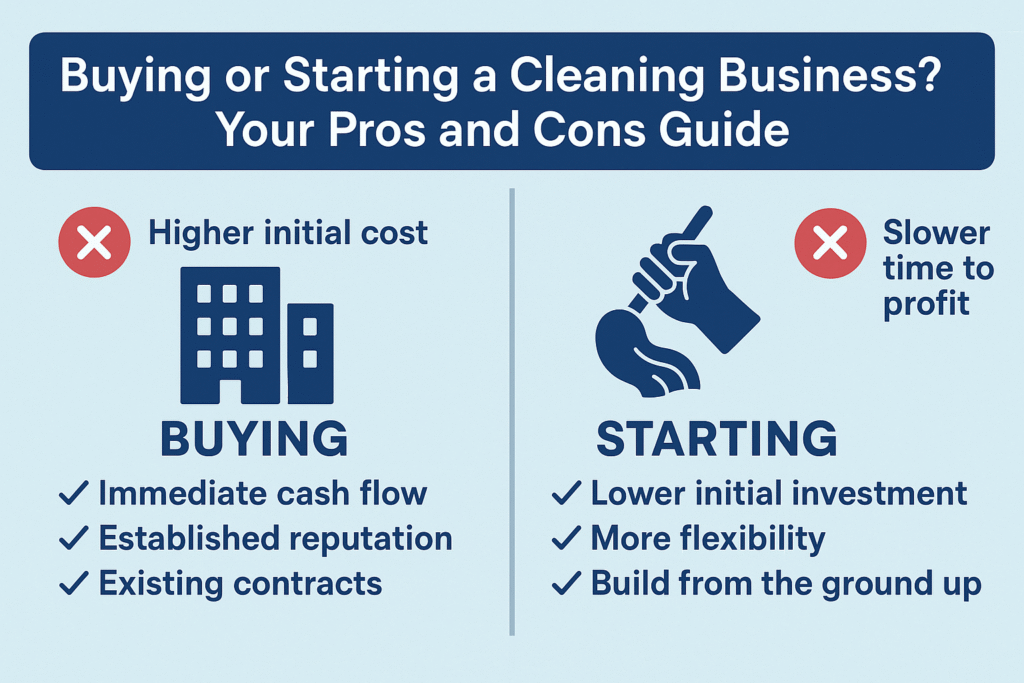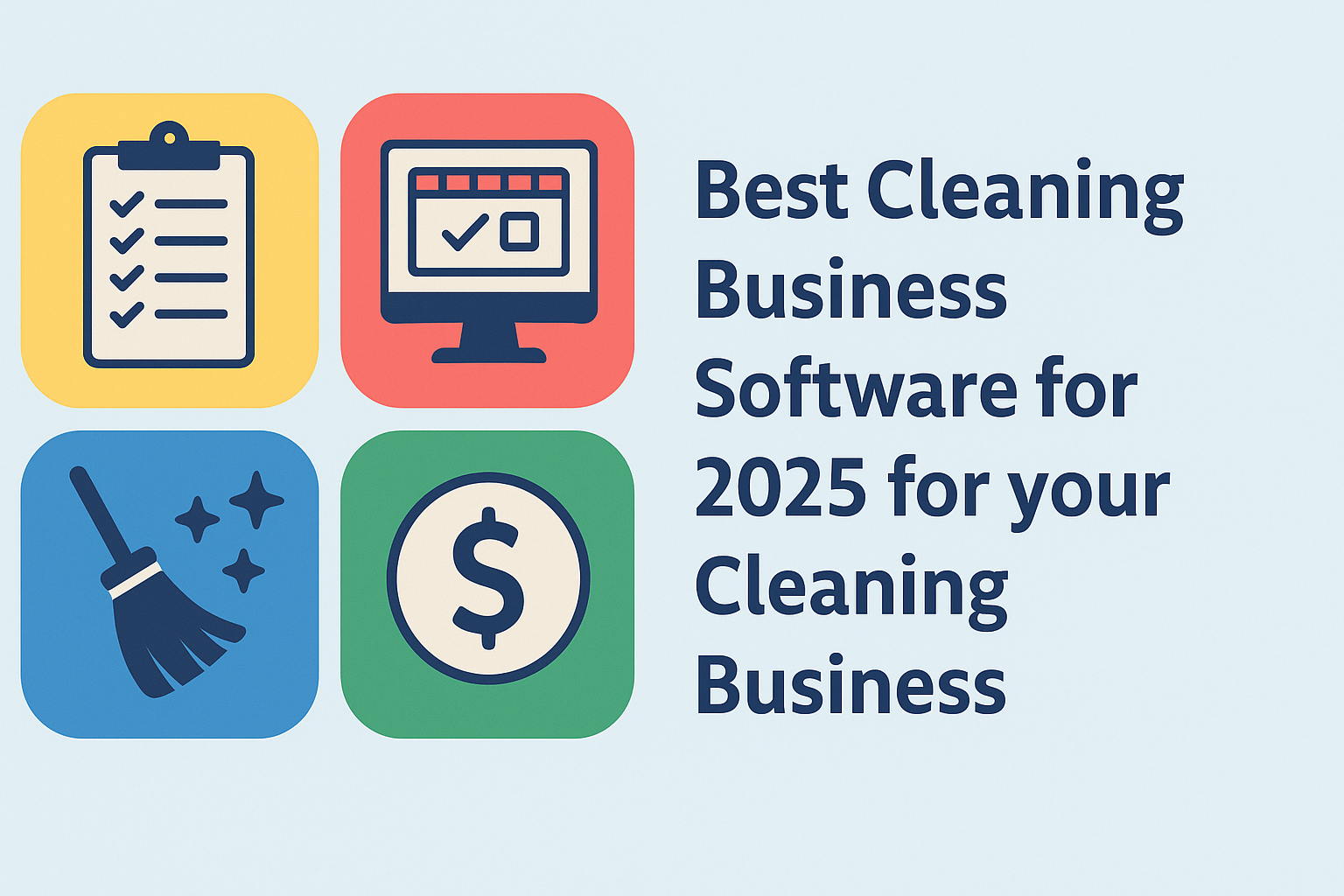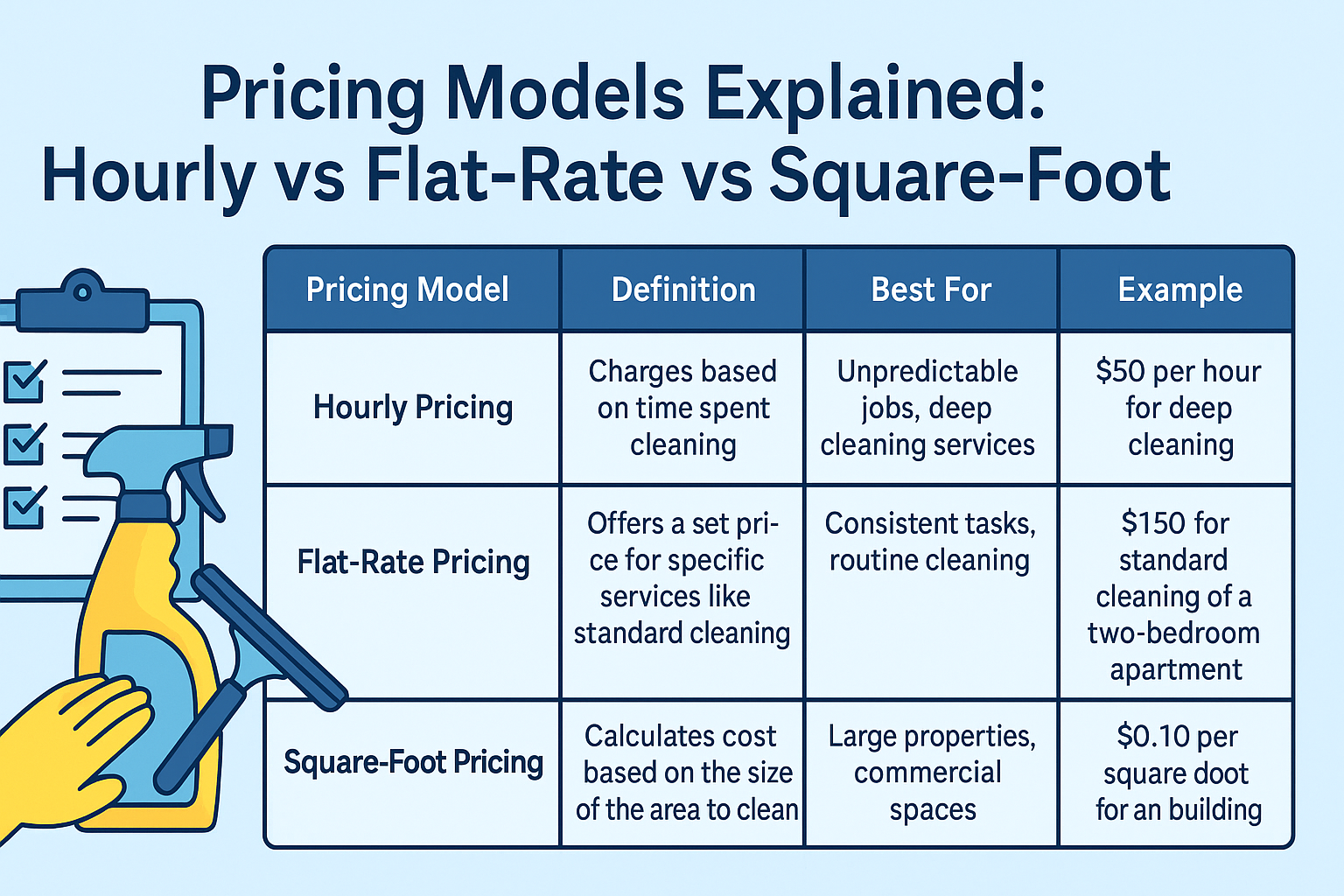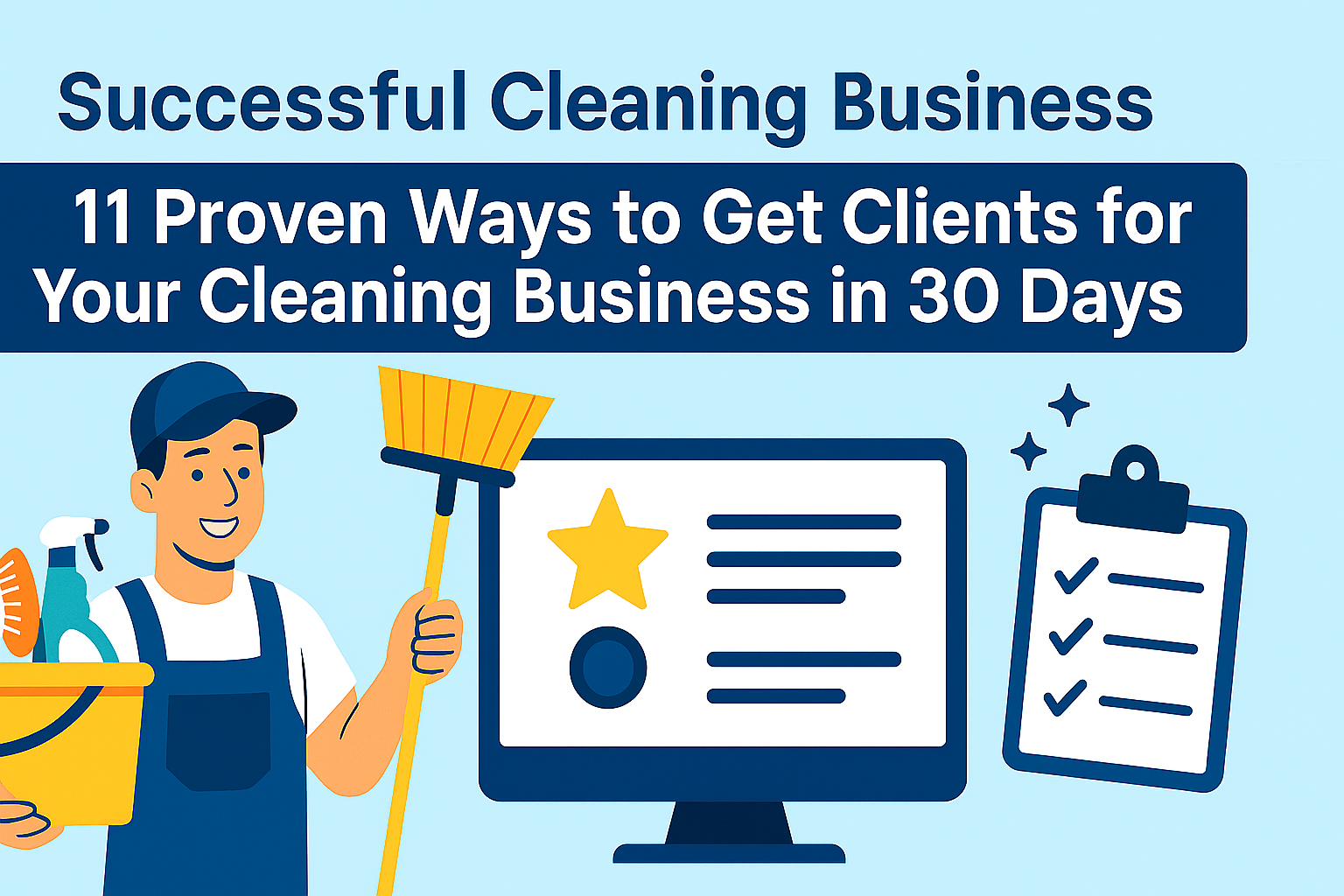Buying or Starting a Cleaning Business? Your Pros and Cons Guide
Understanding the intricate details of launching or acquiring a cleaning business is paramount for aspiring entrepreneurs. This comprehensive guide will dissect the advantages and disadvantages of both approaches, offering a full cost-benefit breakdown to inform your strategic decisions in the dynamic cleaning industry.
Introduction to the Cleaning Business
The Landscape of the Cleaning Industry
The cleaning industry is a robust and ever-expanding sector, providing essential services to both residential and commercial clients, including various franchise opportunities. From deep cleaning services for homes to comprehensive commercial cleaning contracts for large enterprises, the demand for professional cleaning services remains consistently high. Business owners looking to enter this space can find numerous opportunities, whether focusing on house cleaning, carpet cleaning, or specialized commercial cleaning services, making it a potentially lucrative service business.
Understanding the Cleaning Business Model
A typical cleaning business model revolves around providing cleaning services on a contractual or on-demand basis. This can range from recurring residential cleaning to one-off deep cleaning projects for commercial establishments. Understanding the operational aspects, such as managing cleaning supplies and equipment, optimizing routes for efficiency, and maintaining a high level of customer satisfaction, is crucial for any successful cleaning venture, whether you choose to start a cleaning business from scratch or acquire an existing one.
Why Consider Starting or Buying a Cleaning Business?
Many entrepreneurs are drawn to the cleaning business due to its relatively low barrier to entry and consistent demand for clean environments. Whether you decide to start a cleaning business or buy an existing one, the potential for a solid profit margin is attractive. Starting a new cleaning business allows for complete control over branding and service offerings, while buying an existing cleaning company often provides established clientele and immediate cash flow, reducing the initial time-to-profit compared to building a new cleaning business from the ground up.
Cost Considerations
Startup Costs for Starting a Cleaning Business
When you start a cleaning business from scratch, a significant portion of your initial investment will go into essential cleaning supplies and equipment. This includes everything from vacuum cleaners and floor buffers to a wide array of cleaning solutions, often extending to specialized tools for carpet cleaning or deep cleaning. Beyond physical assets, you’ll incur costs for obtaining a business license, developing a comprehensive business plan, and marketing your new cleaning service to attract your first clients. These startup costs are generally lower than acquiring an established entity, offering a financial advantage for those with limited capital.
Costs for Buying an Existing Cleaning Business
Purchasing an existing cleaning business typically involves a much higher upfront investment compared to starting one. The cost to buy an existing cleaning business often includes not just the physical assets and cleaning supplies, but also the valuation of the existing client base, established cleaning contracts, and the goodwill associated with the brand. While this eliminates many initial marketing and branding expenses and provides immediate cash flow, the overall acquisition price can be substantial. Due diligence on the financial health and profit margin of the target company is crucial to ensure it’s a worthwhile sale.
Comparing Cleaning Business Startup Costs
Comparing the cleaning business startup costs reveals a clear distinction. Starting a new cleaning business, while requiring time to build a client base and establish a reputation, demands a lower initial outlay, focusing primarily on essential cleaning supplies and basic operational expenses. In contrast, buying an existing cleaning business offers immediate operational readiness and a pre-existing revenue stream, but at a significantly higher cost per acquisition. The choice hinges on an entrepreneur’s financial capacity and their preference for building from the ground up versus stepping into an established operation within the cleaning industry, particularly a commercial cleaning company.
Pros of Starting a Cleaning Business
Control Over Business Structure
One of the most compelling advantages of choosing to start a cleaning business is the relatively low one-time cost compared to other ventures, especially when considering the cost of cleaning supplies as well as level of control over the business structure. You have the freedom to define your niche, whether it’s residential cleaning services, commercial cleaning, or a specific type, which can influence how much it costs to operate your business. This autonomy allows you to craft a unique brand identity, tailor your service offerings precisely to your vision, and implement operational strategies from day one without inheriting pre-existing challenges or limitations. This level of control is invaluable for business owners who have a distinct vision for their cleaning company, especially if they choose to operate as a commercial cleaning company.
Lower Initial Investment
Starting a new cleaning business generally requires a lower initial investment compared to purchasing an existing operation. Your primary expenditures will be on essential cleaning supplies and equipment, a business license, and perhaps some initial marketing efforts, which contribute to the overall cost to start a cleaning business. This lower barrier to entry makes it an attractive option for aspiring entrepreneurs with limited capital, allowing them to allocate resources incrementally as the business grows. This can significantly reduce the financial risk involved in entering the competitive cleaning industry and building a successful cleaning service from the ground up, especially with effective business software.
Flexibility in Service Offerings
When you start a cleaning business, you gain unparalleled flexibility in defining your service offerings. You can choose to specialize in house cleaning, offer diverse commercial cleaning services, or focus on niche areas like carpet cleaning or deep cleaning. This allows you to adapt to market demands and customer preferences as you grow, experimenting with different service packages and pricing models. This adaptability is a significant benefit, enabling new cleaning businesses to carve out their unique space within the cleaning industry and cater specifically to their target market.
Cons of Starting a Cleaning Business
Time to Establish a Client Base
A significant drawback when you start a cleaning business from scratch is the considerable time required to establish a stable client base and generate consistent revenue. Unlike an existing operation that comes with immediate cleaning contracts, a new cleaning business must invest heavily in initial marketing efforts and networking to attract its first clients. This period of building clientele can mean a slower time-to-profit, as cash flow may be irregular until a sufficient number of recurring residential cleaning or commercial cleaning services are secured. Patience and persistence are key during this initial phase for any new cleaning company, particularly when trying to figure out how much to invest in cleaning service software.
Learning Curve in Operations
Starting a new cleaning business often involves a steep learning curve regarding day-to-day operations, including understanding the cost of cleaning supplies and efficient management practices. New business owners must independently figure out everything from optimizing routes for their cleaning teams to managing cleaning supplies and equipment efficiently, which directly affects the overall cost of cleaning operations. There’s no existing framework or experienced staff to guide them, which can lead to inefficiencies and mistakes in the early stages. This operational learning curve can impact the overall profit margin and customer satisfaction, as the cleaning service refines its processes to become a truly successful cleaning operation.
Initial Marketing Efforts
The burden of initial marketing efforts is a major con for those who choose to start a cleaning business. Without an established brand or existing client base, significant resources must be allocated to advertising, promotions, and building an online presence to attract prospective customers for house cleaning or commercial cleaning services. This can include developing a website, running local ad campaigns, and even offering discounted cleaning services to build testimonials, which can be part of the overall cost of cleaning marketing strategies. These startup costs for marketing can be substantial and delay the point at which the new cleaning business becomes truly profitable.
Pros of Buying an Existing Cleaning Business
Immediate Cash Flow and Clientele
One of the most compelling advantages of buying an existing cleaning business is the immediate cash flow and pre-established clientele it provides. Unlike starting a new cleaning business where you build from the ground up, an acquired cleaning company comes with existing cleaning contracts and a loyal customer base. This means revenue generation begins on day one, significantly reducing the time-to-profit and offering a more secure financial footing. Business owners can leverage this immediate income to further invest in the cleaning service, whether through new cleaning supplies or expanding commercial cleaning services.
Established Reputation and Brand
Acquiring an existing cleaning business means inheriting an established reputation and a recognized brand within the cleaning industry. This eliminates the arduous process of building trust and credibility from scratch, which is often a major hurdle for new cleaning companies. A strong existing brand can attract new clients more easily and retain existing ones, as the quality of the cleaning service is already known and respected. This established goodwill is a valuable asset, contributing directly to the perceived value and market position of the small business.
Existing Contracts and Relationships
A significant benefit of purchasing an existing cleaning business is the transfer of existing cleaning contracts and valuable relationships. This includes ongoing residential cleaning agreements, commercial cleaning contracts, and established partnerships with suppliers for cleaning supplies and equipment. These ready-made relationships provide a stable foundation for the new owner, ensuring continuity of service and revenue. Leveraging these pre-existing agreements allows the new cleaning business owners to focus on growth and operational improvements rather than spending time securing initial contracts or vetting new vendors.
Cons of Buying an Existing Cleaning Business
Higher Initial Costs
While buying an existing cleaning business offers immediate benefits, it generally comes with significantly higher initial costs compared to starting a new cleaning business. The purchase price often includes the valuation of goodwill, existing cleaning contracts, and an established client base, in addition to physical assets like cleaning supplies and equipment. This substantial upfront investment can be a significant barrier for some business owners, requiring more capital or larger loans. This higher entry cost means that even with immediate cash flow, the time-to-profit for recouping the initial investment can be extended, requiring careful financial planning.
Potential Hidden Liabilities
One of the most critical cons of buying an existing cleaning business is the potential for inheriting hidden liabilities. Despite thorough due diligence, there can be undisclosed issues such as outstanding debts, unresolved legal disputes, or unaddressed operational problems that were not apparent during the sale. These hidden liabilities could range from unfulfilled cleaning contracts to undocumented employee grievances or faulty cleaning supplies and equipment. Discovering these after the acquisition can significantly impact the new cleaning business owner’s profit margin and require unexpected expenditures, making a successful cleaning operation more challenging.
Transition Challenges with Existing Staff
Another considerable challenge when acquiring an existing cleaning business involves managing the transition with existing staff. Employees who are accustomed to the previous business owners and their operational style may resist new management or changes to the cleaning service’s processes. This can lead to decreased morale, high employee turnover, or even a decline in the quality of the cleaning job. Integrating new operational strategies, introducing new cleaning supplies, or shifting focus to a different type of residential cleaning or commercial cleaning can be met with resistance, potentially disrupting the seamless delivery of professional cleaning services and impacting customer satisfaction.
Conclusion: Making the Right Choice
Evaluating Your Goals and Resources
The decision to start a cleaning business or buy an existing cleaning company hinges critically on a thorough evaluation of your personal goals and available resources. If your primary aim is complete creative control over your cleaning service, a lower initial investment, and you have the patience to build a client base from scratch, then starting a new cleaning business might be the ideal path. Conversely, if you prioritize immediate cash flow, an established reputation, and are prepared for a higher upfront cost, acquiring an existing successful cleaning business in the cleaning industry could be more suitable for your entrepreneurial aspirations.
Using an Interactive Calculator for Cost-Benefit Analysis
To make an informed decision, business owners should utilize an interactive calculator for a comprehensive cost-benefit analysis. This tool can help compare the startup costs for starting a cleaning business versus the cost to buy an existing cleaning business, factoring in potential time-to-profit, ongoing operational expenses like cleaning supplies, and projected revenue for both scenarios. By inputting various financial parameters and personal preferences, such a calculator can provide a clear quantitative comparison, helping you understand the real financial implications of each path in the competitive cleaning industry.
Final Thoughts on Entering the Cleaning Industry
Ultimately, whether you choose to start a cleaning business or acquire an existing one, entering the cleaning industry offers significant opportunities for growth and profitability, particularly with the right business software in place. Both paths require a robust business plan, a commitment to high-quality service, and strategic management of cleaning supplies and equipment. Careful consideration of your financial capacity, desired level of control, and tolerance for risk will guide you toward the best decision for your entrepreneurial journey, particularly regarding the costs for cleaning businesses. Success in this service business, be it through residential cleaning or commercial cleaning, hinges on understanding your market and providing exceptional professional cleaning services.







